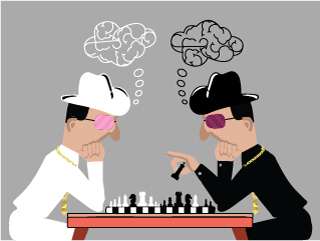
A cartoon of two people sitting across from each other playing chess. Chess is an example of a perfect information game, which is a topic discussed in this course. (Image by MIT OpenCourseWare.)
Instructor(s)
Prof. Mihai Manea
MIT Course Number
14.126
As Taught In
Spring 2016
Level
Graduate
Course Description
Course Features
Course Description
This course provides a rigorous treatment of non-cooperative solution concepts in game theory, including rationalizability and Nash, sequential, and stable equilibria. It covers topics such as epistemic foundations, higher order beliefs, bargaining, repeated games, reputation, supermodular games, and global games. It also introduces cooperative solution concepts—Nash bargaining solution, core, Shapley value—and develops corresponding non-cooperative foundations.
Other Versions
Other OCW Versions
Archived versions: ![]()


